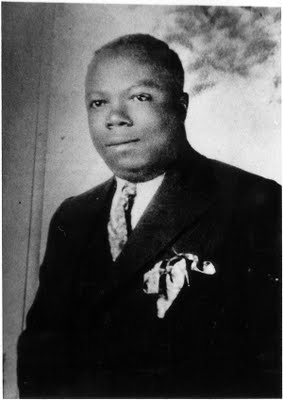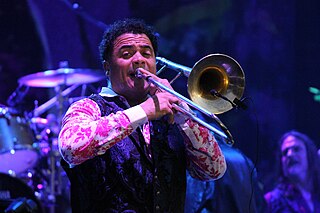Related Research Articles
Carlos Wesley "Don" Byas was an American jazz tenor saxophonist, associated with swing and bebop. He played with Count Basie, Duke Ellington, Art Blakey, and Dizzy Gillespie, among others, and also led his own band. He lived in Europe for the last 26 years of his life.

Coleman Randolph Hawkins, nicknamed "Hawk" and sometimes "Bean", was an American jazz tenor saxophonist. One of the first prominent jazz musicians on his instrument, as Joachim E. Berendt explained: "there were some tenor players before him, but the instrument was not an acknowledged jazz horn". Hawkins biographer John Chilton described the prevalent styles of tenor saxophone solos prior to Hawkins as "mooing" and "rubbery belches." Hawkins cited as influences Happy Caldwell, Stump Evans, and Prince Robinson, although he was the first to tailor his method of improvisation to the saxophone rather than imitate the techniques of the clarinet. Hawkins' virtuosic, arpeggiated approach to improvisation, with his characteristic rich, emotional, and vibrato-laden tonal style, was the main influence on a generation of tenor players that included Chu Berry, Charlie Barnet, Tex Beneke, Ben Webster, Vido Musso, Herschel Evans, Buddy Tate, and Don Byas, and through them the later tenormen, Arnett Cobb, Illinois Jacquet, Flip Phillips, Ike Quebec, Al Sears, Paul Gonsalves, and Lucky Thompson. While Hawkins became known with swing music during the big band era, he had a role in the development of bebop in the 1940s.
McKinney's Cotton Pickers were an American jazz band, founded in Detroit, Michigan, United States in 1926, and led by William McKinney, who expanded his Synco Septet to ten players. Cuba Austin took over for McKinney on drums, with the latter becoming the band's manager. Between 1927 and 1931, they were one of the most popular African American bands. Many of their records for Victor were bestsellers.

Irving Milfred Mole known professionally as Miff Mole, was an American jazz trombonist and band leader. He is generally considered one of the greatest jazz trombonists and credited with creating "the first distinctive and influential solo jazz trombone style."
The swing era was the period (1933–1947) when big band swing music was the most popular music in the United States. Though this was its most popular period, the music had actually been around since the late 1920s and early 1930s, being played by black bands led by such artists as Duke Ellington, Jimmie Lunceford, Bennie Moten, Cab Calloway, Earl Hines, and Fletcher Henderson, and white bands from the 1920s led by the likes of Jean Goldkette, Russ Morgan and Isham Jones. An early milestone in the era was from "the King of Swing" Benny Goodman's performance at the Palomar Ballroom in Los Angeles on August 21, 1935, bringing the music to the rest of the country. The 1930s also became the era of other great soloists: the tenor saxophonists Coleman Hawkins, Ben Webster and Lester Young; the alto saxophonists Benny Carter and Johnny Hodges; the drummers Chick Webb, Gene Krupa, Jo Jones and Sid Catlett; the pianists Fats Waller and Teddy Wilson; the trumpeters Louis Armstrong, Roy Eldridge, Bunny Berigan, and Rex Stewart.

Benjamin Francis Webster was an American jazz tenor saxophonist.

Benjamin Moten was an American jazz pianist and band leader born and raised in Kansas City, Missouri, United States.

The Blanton–Webster Band is a compilation album that combines the master takes of all the recordings by Duke Ellington's Orchestra during the years of 1940 to 1942, involving bassist Jimmy Blanton and tenor saxophonist Ben Webster. The recordings were originally made for RCA Victor during what many critics regard as the Ellington orchestra's golden period. The three CDs contain many numbers which were to become classics, and the arrangements were frequently inventive and innovative.

John Kirby, was an American jazz double-bassist, who also played trombone and tuba. In addition to sideman work, Kirby is remembered for leading a successful chamber jazz sextet in the late 1930s and early 1940s, which scored several hit songs including "Loch Lomond" and the debut recording of "Undecided", a jazz standard. He is perhaps the first musician in the chamber jazz genre.

Herschel "Tex" Evans was an American tenor saxophonist who was a member of the Count Basie Orchestra. He also worked with Lionel Hampton and Buck Clayton. He is also known for starting his cousin Joe McQueen's interest in the saxophone. Joe McQueen, living until 2019 at age 100, may well have been the last surviving person to have known Herschel during his lifetime.
Hilton Jefferson was an American jazz alto saxophonist born in Danbury, Connecticut, United States, perhaps best known for leading the saxophone section from 1940–1949 in the Cab Calloway band. Jefferson is said to have been "a soft, delicate saxophone player, with an exquisite sensibility."
Booker Pittman or Pitman was a jazz clarinetist who played with Louis Armstrong and Count Basie in the US and Europe in the 1920s and 1930s. He also played alto and soprano saxophones.

Clark Gayton is an American multi-instrumentalist, musician, composer and musicians' rights advocate.
Elmer, or Elbert, "Skippy" Williams was an American jazz tenor saxophonist and musical arranger.
Progressive Records is an American jazz record company and label owned by the Jazzology group. It produces reissues and compilations of musicians such as Sonny Stitt, Eddie Barefield, George Masso, and Eddie Miller.
Clyde Hart was an American jazz pianist and arranger. He was an important figure in the transition from swing to bebop.
The Cab Calloway Orchestra, based at the exclusive Cotton Club in Harlem, was, for more than a decade, one of the most important jazz bands in America. Different lineups featured the best available established musicians.
Jesse Miller, Jr. was an American jazz trumpeter and bandleader.
"My Greatest Mistake" is a popular song written in 1940 by Jack Fulton and Jack "Bones" O'Brien.
Paul Banks was an American jazz pianist, bandleader, composer and lyricist.
References
- 1 2 3 4 Driggs, Frank; Chuck Haddix (2005). Kansas City Jazz: From Ragtime to Bebop-A History, pp. 93, 249, 286. Oxford University Press, ISBN 019536435X, 9780195364354. Google Books. Retrieved 10 December 2022.
- 1 2 3 Russell, Ross (1971). Jazz Style in Kansas City and the Southwest, p. 116. University of California Press, ISBN 0520018532, 9780520018532. Google Books. Retrieved 10 December 2022.
- ↑ Jet, p. 61. 28 June 1962. Google Books. Retrieved 10 December 2022.
- ↑ Pearson, Nathan W. (1987). Goin' to Kansas City, p. 75. University of Illinois Press. Google Books. Retrieved 11 December 2022.
- ↑ "Jap Allen's Cotton Club Orchestra, 1930". University of Missouri-Kansas City. Retrieved 10 December 2022.
- ↑ Gitler, Ira (1985). Swing to Bop: An Oral History of the Transition in Jazz in the 1940s, p. 107. Oxford University Press, ISBN 0198020708, 9780198020707. Google Books. Retrieved 10 December 2022.